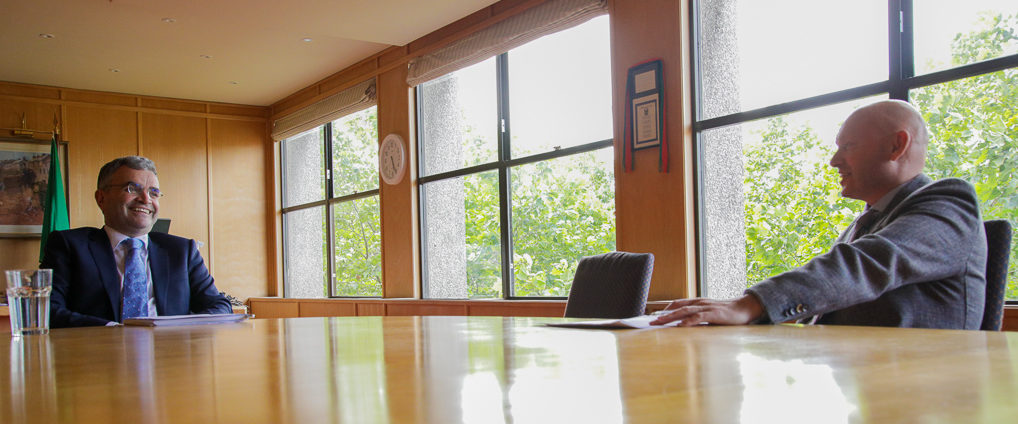Minister for Agriculture, Food and the Marine Dara Calleary has set his sights on continuing the EU policy of convergence when it comes to direct payments (to farmers) under the new Common Agricultural Policy (CAP).
In his first ministerial sit-down interview with an agricultural media outlet, newly-appointed Minister Calleary touched on a broad range of issues – in conversation with AgriLand editor Jim Breen and news journalist Sylvester Phelan.
Speaking at length to AgriLand yesterday, Tuesday, July 21, the new minister – appointed just seven days ago – outlined his stance on the topic of convergence, which aims to bring about a narrowing of the difference between actual and average direct payments (paid on a per-hectare basis) to farmers across the EU.
The issue of convergence [of direct payments] features heavily in newly-published CAP documentation. What is your view on convergence of direct payments here in Ireland?
Minister Calleary: Convergence was a policy in the last CAP. There were challenges at that stage [but] €100 million was transferred from 2014 to 2020.
Also Read: Convergence in the next CAP: ‘All…will have a level of at least €200/ha in 2022’I personally believe in convergence; I’ve asked for options to be prepared here in relation to convergence during transition. I’ve asked the officials here to give me the options on that…and we’ll make decisions on that.
But my party believes in it; I believe in it – but it has to be done collaboratively as well.
Is there a danger, associated with policies such as convergence, that we’re taking money away from intensive, highly-productive farmers – albeit a smaller number of them – with a viable, full-time enterprise and giving that money to a greater number of part-time farmers who have other sources of income?
IS CAP about food security or is it about sustaining people in rural communities?
Minister Calleary: I think CAP is both; CAP has always been both. Pillar II, in particular, in terms of rural development is there to rebuild sustainable rural communities.
CAP is also going to have a role in terms of overall sustainability – in terms of environmental sustainability. But I think the objectives in terms of intensity and production can also be met…and can be met within CAP.
The agri-food sector is incredibly important to us in terms of our exports; in terms of our overall economy. We have to protect that, allow it to grow and allow it to grow sustainably.
I’m going to continue the policy; it’s something the EU has been driving.
It was driven in the last CAP. It’s something that I would be very much committed to in the context of the next CAP. We’re preparing all the options of how we do that.
As part of yesterday’s announcement, there will be a facility to cap [place an upper limit] on direct payments to individual recipients. That will be voluntary for member states. Have you any strong feelings on this measure, with a view to implementing it here in Ireland?
Minister Calleary: I’m going to consult with the farm organisations and I’m going to talk to the officials here [in the Department of Agriculture, Food and the Marine] around the specifics.
It’s something we’re going to look at. [But] I don’t want to impact on the productive rate of agriculture, but there does have to be an element of fairness as well.
There does have to be an element of solidarity. I’m going to [look at] the various options on that.
The EU and the European Commissioner for Agriculture and Rural Development have indicated that member states will have more flexibility – in terms of how CAP money is spent at national level.
Is there anything specific whereby you would like to see Ireland availing of that flexibility…or deviating from what is the ‘normal’ EU approach?
Minister Calleary: I met the commissioner yesterday; we had an opening conversation around it; we’re going to have a longer conversation – ‘virtually’ – over the course of the next 10 days or so.
Those member state flexibilities are important. I think they’ve been very important over the years to CAP.
What happens here – our conditions here; our market conditions; our environmental conditions – are very different from other countries.
I’ll be seeking to use that flexibility in as much is possible, whilst being consistent to the principles of CAP and consistent to the principles of the commission as well. The flexibilities are important.
Stay tuned to AgriLand for further articles (on other pressing topics) from our extensive interview with the new Minister for Agriculture, Food and the Marine…



